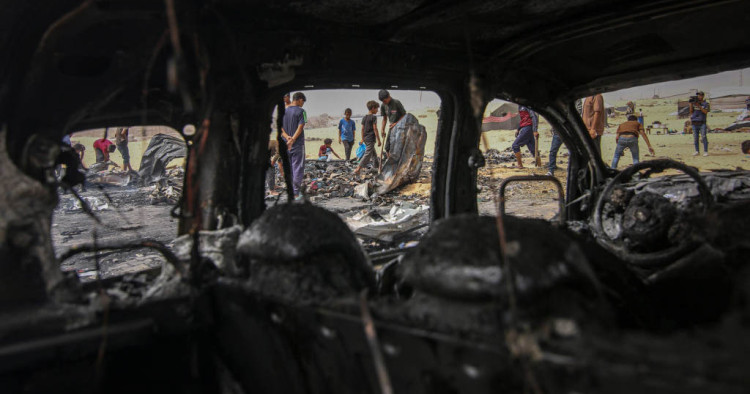Contents:
- Rafah strike exposes the hollowness of America’s "values"-centric foreign policy agenda
- Egyptian-Israeli relations fast becoming another casualty of the conflict in Gaza
- Israeli government’s banking-sector plans would financially strangle Palestinian Authority
- Ireland, Spain, and Norway recognize Palestinian statehood
- Integrated air-defense strategy for the Gulf: An opportunity to address a fixable problem
- Designating Kenya as a Major Non-NATO Ally is a turning point for Biden’s failing Africa policy
Rafah strike exposes the hollowness of America’s “values”-centric foreign policy agenda
Brian Katulis
Senior Fellow for US Foreign Policy

-
An Israeli military strike targeting two Hamas operatives ended up killing at least 45 civilians in Rafah, raising more questions about the Biden administration’s commitment to enhancing civilian protections in the Israel-Hamas war.
-
This latest incident raises additional questions about US policy in the next phase of the conflict and surfaces concerns about America’s overall commitment to values in its foreign policy.
Israel’s military attack targeting two Hamas operatives, which ended up killing at least 45 Palestinian civilians and wounding another 249 people, highlighted once again the concerns that the Biden administration and many in the international community have raised about the high human costs of an Israeli military operation in Rafah. The deadly strike was widely criticized around the world. Israeli Prime Minister Benjamin Netanyahu called the incident a “tragic accident” and promised a complete investigation in a speech to the Israeli Knesset Monday night.
Yet again, another incident in the Israel-Hamas war exposes the hollowness of many of the statements and policy moves aimed at enhancing protections for civilians caught in the crosshairs in a war between Hamas and Israel.
More than three months ago, US President Joe Biden was asked in an MSNBC television interview if an invasion of Rafah was a red line, Biden replied, “It is a red line.” In that same interview, Biden voiced criticisms of Israel’s conduct in the war, saying that Netanyahu was “hurting Israel more than helping Israel,” and he argued that the Israeli prime minister “must pay more attention to the innocent lives being lost as a consequence of the actions taken.” Like the “red line” in the Syrian civil war articulated by the Obama administration, in which Biden served as vice president, it seems like there are few or no consequences for crossing this red line, though the Biden administration is still waiting to hear more facts on this attack before making a determination about its policy approach.
For the past few weeks, the Biden administration has engaged the Israeli government in extensive discussions about the military operation in Rafah, aiming to prioritize the protection of civilians. Even after hundreds of thousands of civilians moved to get out of the way, innocent civilians and international aid workers continue to be killed in military operations targeting Hamas and its military capabilities.
As I outlined in a special MEI assessment at the six-month mark of the war, the Biden administration this spring has made more statements and taken policy steps to increase the level of humanitarian assistance getting to Palestinians in the Gaza Strip. But it remains to be seen what major impact these statements and measures have had on Israel’s conduct of the war. For sure, Hamas continues to cynically use innocent civilians and hides behind them as shields, complicating the military effort; but the loss of innocent civilian lives continues to mount.
Moreover, America’s growing isolation in the world regarding how it speaks and acts on the Israel-Hamas war in Gaza is increasingly evident. The Biden administration, which has episodically talked about a “values based” foreign policy, has struggled to apply this framework to the Gaza war. It held two “Summits for Democracy” aimed at stressing its support for such a foreign policy, but none of these exercises have seemed to generate policies or principles that the Biden administration has been able to apply to this war, no doubt a complicated task.
Adding to this dismal scene is the fact that Biden’s chief rival in the 2024 presidential election, former US President Donald Trump, has told donors that he would crush pro-Palestinian protests and deport demonstrators if he is elected president again. The lack of empathy for Palestinian civilians remains apparent across America’s political spectrum.
Follow: @Katulis
Egyptian-Israeli relations fast becoming another casualty of the conflict in Gaza
Mirette F. Mabrouk
Senior Fellow and Founding Director of the Egypt program

-
Over the past 55 years, the Camp David Accords between Egypt and Israel have been the bedrock of regional stability.
-
A recent shooting incident involving Israeli and Egyptian forces exemplified one of Egypt’s major concerns since October of last year: that the conflict would spill over its borders.
The costs of the ongoing conflict in Gaza continue to soar. Just two days after a ruling by the International Court of Justice (ICJ) that ordered Israel to “immediately halt its offensive in Rafah,” a nighttime Israeli airstrike hit a tent camp of displaced Palestinians sheltering in an area that had been designated as a humanitarian safe zone. As of Monday evening, at least 45 people were reported killed and hundreds more injured, either in the initial explosions or the subsequent fires they ignited that raged through the camp.
While the human costs of the conflict continue to escalate — 1,200 Israelis killed in the original attack by Hamas on Oct. 7, 2023, and 250 taken hostage, and over 36,000 Palestinians killed since then (the majority of whom are women and children), according to the Gazan Ministry of Health — there have been other costs as well. While none of them will compare to the toll of the civilian deaths, they might well have greater regional ramifications, including the rapidly deteriorating relationship between Egypt and Israel.
Over the past 55 years, the Camp David Accords have been the bedrock of regional stability. Once Egypt made peace with Israel, it removed itself from any military conflict, effectively guaranteeing that Israel would not be attacked by any Arab army. Over the decades, the relationship between the two countries developed into a solid one — never on a people-to-people basis, but in terms of intelligence, security, and political cooperation. One of the very few weak points in this relationship has always been the status of the Palestinians. Public opinion in Egypt is consistently and overwhelmingly empathetic with the Palestinians, and the current conflict in Gaza has intensified that sentiment significantly. The Egyptian government has had to tread an extremely fine line between managing the country’s diplomatic commitments and taking into account public opinion. However, the conflict has created one diplomatic challenge after another. At the beginning, Israel lobbied the European Union to pressure Egypt into taking Palestinian refugees, something Cairo refused to do, both for its own security as well as, more importantly, to avoid being complicit in another forced displacement of Palestinians. The Egyptians felt that the Israelis were continuously testing their boundaries; while Israel stated that it was not its intention to force Palestinians into Egypt, it pushed them up against its border in Rafah, leaving them with nowhere else to flee, setting up a reverse exodus.
Tensions have only continued to rise since then. The raising of the Israeli flag in Rafah, also in violation of the 1978 treaty, caused resentment across the border, leading the Egyptians to close the Rafah border to aid for the first time since the conflict began. They maintained that since Israel was now an occupying force in Rafah, it had to live up to its obligations under international law and take responsibility for the people it occupied. When Israeli Foreign Minister Israel Katz said that “the key to preventing a humanitarian crisis in Gaza is now in the hands of our Egyptian friends,” his Egyptian counterpart Sameh Shoukry shot back his country’s “categorical rejection of the policy of distorting facts and disavowing responsibility adopted by Israel,” asserting that Israel was “solely responsible for the humanitarian catastrophe currently endured by Palestinians in Gaza” and calling on it to “assume its legal responsibility as the occupying power by allowing aid access through the land ports that are under its control.”
And to further exacerbate tensions, Israeli Prime Minister Benjamin Netanyahu declared last April that Israel had to have control of the Philadelphi Corridor, the 14-km buffer zone between Egypt and Gaza, which the Egyptians have warned is in violation of an amendment to the peace accords. Egyptian security personnel were also worried that the presence of Israeli troops right on Egypt’s doorstep would increase the risks of a border incident.
And then, on May 27, initial Israeli reports emerged of an exchange of gunfire across the border between Egyptian and Israeli forces, resulting in the death of an Egyptian soldier. Both militaries said the incident was under review and they “were discussing” it with each other. Later that evening, Egypt warned against “compromising the security and safety of its security forces,” a high-level source told Egypt’s state-linked Al Qahera News.
Preliminary investigations showed that Egyptian security personnel had reacted to an exchange of gunfire “between Israeli forces and members of the Palestinian resistance, which led to shooting in several directions,” the source said, adding that Egypt would take the necessary measures to prevent the incident from recurring. In fact, the incident exemplified one of Egypt’s major concerns since October of last year: that the conflict would spill over its borders. That eventuality isn’t in anyone’s interest.
Follow: @mmabrouk
Israeli government’s banking-sector plans would financially strangle Palestinian Authority
Anas Iqtait
Non-Resident Scholar

-
Israel’s finance minister has announced plans to halt the transfer of clearance revenue — Palestinian taxes collected by Israel — to the Palestinian Authority, and he will not extend the indemnity granted to Israeli banks that facilitate fund transfers to Palestinian financial institutions.
-
The failure to extend these letters would plunge the Palestinian economy into complete collapse and possibly a humanitarian catastrophe, since the economy primarily functions using the Israeli shekel, making it dependent on financial linkages with Israel for transactions both domestically and internationally.
In what would be a devastating blow to the Palestinian economy, Israel is poised to terminate the safeguards supporting correspondent banking relationships (CBRs) between Palestinian and Israeli banks. Israeli Finance Minister Bezalel Smotrich announced last week plans to halt the transfer of clearance revenue — Palestinian taxes collected by Israel — to the Palestinian Authority. Additionally, he will not extend the indemnity granted to Israeli banks that facilitate fund transfers to Palestinian financial institutions. CBRs are indispensable for enabling financial transactions between the Palestinian economy, Israel, and the global market.
The Israeli government has been granting temporary “letters of indemnity and immunity” to protect Israeli banks from both domestic and international perceived risks or legal repercussions linked to transactions with Palestinian banks. These indemnity letters have been routinely renewed, typically for periods ranging from six months to a year, by the Israeli finance minister. The indemnity period that concluded in September 2023 was renewed for six months, whereas the one that concluded on March 31, 2024, was extended at the last minute for only three months.
The failure to extend these letters would plunge the economy of the Palestinian Territories into complete collapse. The Palestinian economy primarily functions using the Israeli shekel as its de facto currency, making it dependent on financial linkages with Israel for transactions both domestically and internationally. These transactions are exclusively facilitated by the Bank of Israel and private Israeli banks. Disrupting this connection would impede critical banking services, including fund transfers, card transactions, and check clearing.
Furthermore, it might manifest in a humanitarian catastrophe. Fuel shortages would ensue rapidly, as fuel is supplied daily from the Israeli market. Import activities from Israel and international markets would grind to a halt, leaving Palestinian traders unable to compensate their Israeli and global counterparts. This disruption would precipitate a supply shock in food and other essential goods, causing prices to soar and eventually leading to severe shortages. Additionally, electricity, water, internet, and phone supplies would be disrupted, as payments to Israeli suppliers would be largely unfeasible.
This crisis would unfold against a backdrop of a multifaceted, decade-long economic and fiscal crisis, compounded since October 2023. Recent reports estimate a GDP decline of over 80 percent in Gaza, while unemployment there has soared to 75 percent. Whereas in the West Bank, Israeli closure policies and the suspension of at least 144,000 work permits for Palestinian workers in Israel and Israeli settlements have led to the loss of 300,000 jobs. The Palestinian Authority is operating on shallow aid handouts while accumulating arrears against domestic suppliers valued at 50 percent of GDP.
If Smotrich implements his threat to suspend the existing CBR arrangement without establishing an alternative system to facilitate the necessary clearance and transfer requirements, the Palestinian banking system’s connection to the global market will be severed, and the economic crisis developing in the West Bank will likely transform into a humanitarian catastrophe.
Follow: @AnasIqtait
Ireland, Spain, and Norway recognize Palestinian statehood
Emiliano Alessandri
Non-Resident Scholar

-
Ireland’s and Spain’s decision (Norway is not a member of the European Union) to recognize Palestine is more significant for breaking EU ranks than for its concrete legal implications.
-
While it is important that the EU remains diplomatically involved in helping resolve the Israeli-Palestinian conflict, as it is doing by proactively engaging Arab countries toward a possible regional solution, its international agency remains hostage to its internal differences and political cycles.
Perhaps Ireland’s, Spain’s, and Norway’s decision to recognize Palestinian statehood will help resurrect the vision of a two-state solution, which Israeli Prime Minister Benjamin Netanyahu defiantly rejects despite the international community’s long-standing support for it. Perhaps, as Spain’s Prime Minister Pedro Sanchez rushed to clarify, this is not to be seen as a move against Israel — Netanyahu decried it as a “reward for terrorism” — but as a contribution to peace. Perhaps more European countries will soon follow, joining the global grouping of over 140 states (out of 193 members of the United Nations) that support Palestinian statehood. Perhaps. But at this difficult juncture, with Rafah coming under heavy fire despite calls by the International Court of Justice, the United States, the European Union, and others to spare the city, it is hard not to write this diplomatic initiative off as yet another sign of internal European division, revealing Europe’s continuing failure to exert coordinated pressure on Israel.
The diplomatic move by Ireland, Spain, and Norway was widely expected, in light of their respective national debates and growing public support for bold gestures in favor of Palestine’s long-standing claim. What is more interesting — and politically relevant — is that other European countries that have been leaning toward the same approach are for now refraining, among them Malta, Slovenia, and Belgium. Indeed, during its presidency of the Council of the European Union (January to present), Belgium has been increasingly vocal about Palestinian rights; but upcoming national elections, among other factors, may have suggested some caution. In fact, with the several national election cycles in play and the election of a new European Parliament scheduled for June 6-9, European governments have decided to handle the sensitive Middle East file differently depending on domestic political circumstances and the color of their ruling parties.
Against this patchy background, Ireland’s and Spain’s decision (Norway is not an EU member) is more significant for breaking EU ranks than for its concrete legal implications. The fewer than 10 EU members that had already recognized Palestinian statehood almost all did so in 1988, before they entered the EU (they are mostly former members of the Warsaw Pact). Until this past week’s recognition declarations, only Sweden had similarly broken ranks within the EU on Palestine, in 2014. Moreover, the fact that the current Swedish government has a different stance on the Palestinian question from the social democrats who ruled the country in the mid-2010s shows how volatile the issue can be. What is sorely missing is a pondered approach that would apply to all 27 EU member states, transcending national political cycles and today’s agendas. While views within the EU have converged somewhat since the outbreak of the ongoing war, an EU-wide consensus remains elusive.
It would be too cynical to dismiss the entire EU diplomatic effort after the Oct. 7, 2023, Hamas terrorist attack as futile. The EU High Representative Josep Borrell has relentlessly worked to coordinate a common European position at critical turning points of the conflict, sometimes successfully so. The Spanish and Belgian presidencies of the EU have worked in tandem during 2023-2024 to persuade Israel that a resumption of peace talks is instrumental to the political — as opposed to just military — defeat of Hamas. And with the Israeli government deeply reluctant to change the parameters of its open-ended military campaign that has killed tens of thousands, EU heavyweights Germany and France have become increasingly critical of Israeli policy. French President Emmanuel Macron notably stated in February that the recognition of Palestinian statehood is no longer a taboo for Paris.
Yet the EU has for now failed to coalesce around measures that would exert tangible pressure, signally in the field of trade and economic relations (the EU is the biggest provider of Palestinian assistance and Israel’s largest trade partner). It is reported that sanctions were for the first time seriously discussed during the latest meeting of EU foreign ministers; but predictably, an agreement was not within reach at this time.
While it is important that the EU remains actively involved in the resolution of the conflict, as it is doing by engaging Arab countries, its international agency remains to date hostage to its internal differences and political cycles. With uncompromisingly pro-Israel Hungary taking over the presidency of the EU Council in July, distilling a common and meaningful European Union position will continue to be a challenge.
Integrated air-defense strategy for the Gulf: An opportunity to address a fixable problem
Joseph L. Votel
Distinguished Senior Fellow on National Security

-
Since the April 13 Iranian drone and missile attack on Israel, there is renewed motivation and opportunity to address the long-standing gap in combined capability among Gulf states to defend against air threats.
-
Three areas should be addressed to confront this long-standing shortfall: an honest assessment of air-defense capabilities and needs across the Gulf countries, a commitment to better information sharing among them, and an effort to create, sustain, and expand processes among the Gulf states to operate more effectively.
The April 13 Iranian drone and missile attack on Israel was a wakeup call for both the Middle East and the international community. In addition to bringing the region to the precipice of open state-on-state conflict for the first time in nearly half a century, it also highlighted the increasing importance of an integrated air-defense strategy in the Gulf. There is now a motivation and opportunity to address this long-standing gap in combined capability against air threats becoming more pronounced and severe.
As regional chiefs of defense gather in the coming weeks, we should watch for three areas indicative of positive change to address this long-standing shortfall.
First, there must be an honest assessment of air-defense capabilities and needs across the Gulf countries. The missile and drone threat from Iran is a serious one. As a result, the Gulf states must come to a consensus on interoperable systems that provide exquisite situational awareness, early warning, and effective shootdown capabilities. The United States must ensure that the best American systems are considered in this mix — more rapidly and responsively than we have in the past. Good, integrative technology in the hands of well-trained partners can make up for the downsizing of US forces in the region and place the emphasis where it needs to be — on effective regional self-defense.
Second, there must be a commitment to better information sharing among all the Gulf states, as this has historically been a problem. Too often, the United States plays the role of information broker. The essential issue here is trust between all the Gulf states. A good way of moving forward would be to agree on creating an Arab state-generated “common operational picture” to which Western military capabilities (eventually including Israel) could contribute. A common Gulf air operations center and exchange of liaison officers would also be good indicators of progress.
Finally, there must be an effort to create, sustain, and expand processes among the Gulf states to operate more effectively. One way to do this is to build on the developing “missile conferences” to address anomalies in the air environment and strive to share information and devise action plans. Having effective processes and approaches is a critical way for military organizations to build confidence in themselves while at the same time promoting trust with their partners.
The motivation to address this long-standing shortfall in defense capability is clear and present — let’s hope the Gulf countries take advantage of this and move forward with true integrated capability.
Designating Kenya as a Major Non-NATO Ally is a turning point for Biden’s failing Africa policy
Guled Ahmed
Non-Resident Scholar

-
Amid the expansion of Russian influence on the continent and tensions with countries as varied as South Africa, Niger, and Djibouti, the US is moving to strengthen its relationship with Kenya, pledging to designate Nairobi as a Major Non-NATO Ally.
-
With Sub-Saharan Africa facing numerous security challenges, from the ongoing civil war in Sudan and the precarious peace in Ethiopia to the instability in the Democratic Republic of the Congo as well as across West Africa and the Sahel, Kenya's importance as a reliable regional partner for the US cannot be overestimated.
On May 23, as US President Joe Biden welcomed his Kenyan counterpart, William Ruto, for a state visit, the White House took a major step toward cementing the 60-year-old bilateral relationship between the United States and Kenya. By pledging to designate Kenya as a Major Non-NATO Ally, a first for a sub-Saharan African country, the US sent a resounding message of trust in the region. This crucial move not only boosts Kenya’s stature as a key US ally, but also marks a turning point for the Biden administration's faltering “partner-led, US-enabled” policy toward the continent. With regional players in Africa gravitating toward multilateralism through the BRICS bloc led by China and Russia, the US has found itself on the back foot, especially in light of South Africa’s support for Russia in the Ukraine war and opposition to US policy on the war in Gaza. Russia’s influence has also been steadily growing in West Africa and the Sahel, with the junta in Niger kicking out US troops despite Washington’s construction of a more than $100 million drone base to aid in the fight against terrorism and its provision of military assistance. Even Djibouti, home to US Africa Command’s main base in the Horn of Africa, has refused to allow American forces to launch strikes from its territory against the Houthis amid their ongoing attacks on commercial vessels in the Red Sea. But in this hour of uncertainty, the US has found strong support from Kenya, and it is clear that its partnership with Nairobi will extend far beyond the African continent.
Kenya stood strong with the US amid difficult times, lending support during Russia’s 2022 full-scale invasion of Ukraine by participating in the Ukraine Defense Contact Group and abiding by the US-imposed Russia sanctions, even at the cost of millions in lost trade and concerns over food security. Kenya has also shown its commitment to global security by deploying 1,000 special forces police to Haiti to lead a United Nations-backed international mission and joining Operation Prosperity Guardian, the US-led multinational maritime security effort formed in December 2023 to respond to the Houthi attacks on Red Sea traffic.
In stark contrast, Djibouti, once hailed as a key part of the US’s War on Terror, has now become its most unreliable partner in the region. This is exemplified by its disregard for US concerns, such as allowing an Iranian spy ship to dock off the coast from a Chinese military base in Djibouti, potentially providing vital intel to the Houthis. Djibouti’s lack of cooperation has only further underscored Kenya's position as a reliable and trustworthy regional partner.
The US’s initial plans to establish a military base in Berbera, Somaliland, were thwarted due to Somalia's ongoing proxy war with Somaliland. This was a result of President Biden's failing Africa policy, which prioritizes a “one-Somalia” approach through “partner-led, US-enabled” efforts, further complicated by the Ethiopia-Somaliland maritime access deal. With the looming eviction of US troops from Niger, Kenya is the most economically and politically feasible option to rehouse them. Indeed, President Biden seem to have already taken a proactive step in that regard by initiating a new military base in Wajir County, Kenya, alongside the existing base in Manda Bay, to accommodate them. With Sub-Saharan Africa facing numerous security challenges, from the ongoing civil war in Sudan and the precarious peace in Ethiopia to the instability in the Democratic Republic of the Congo as well as across West Africa and the Sahel, Kenya's significance as a Major Non-NATO Ally and a reliable regional partner cannot be overestimated.
Moving forward, President Ruto will have to manage issues as varied as dealing with the withdrawal of the African Union Transition Mission in Somalia and potential resulting resurgence of al-Shabaab, handling the warring factions in the Congo, finding a win-win solution for Ethiopia’s maritime access issue to address its dispute with Somalia, managing the delicate alliance between Somalia and Turkey, and contending with the ongoing civil war in Sudan — not to mention the looming uncertainty of the upcoming US election in November. As we enter a multipolar world, Ruto must deftly maneuver through geopolitical tensions, looming trade wars, and the ever-present threat of Russian and Iranian influence in the Horn of Africa. As he tries to navigate these myriad challenges and the intricacies of Sub-Saharan African politics, there is likely to be no hakuna matata.
Follow: @GuledWiliq
Photo: Ahmad Salem/Bloomberg via Getty Images
The Middle East Institute (MEI) is an independent, non-partisan, non-for-profit, educational organization. It does not engage in advocacy and its scholars’ opinions are their own. MEI welcomes financial donations, but retains sole editorial control over its work and its publications reflect only the authors’ views. For a listing of MEI donors, please click here.













